Comparisons of Ghost CMS to other blogging platforms like WordPress, Medium, Wix, and Drupal
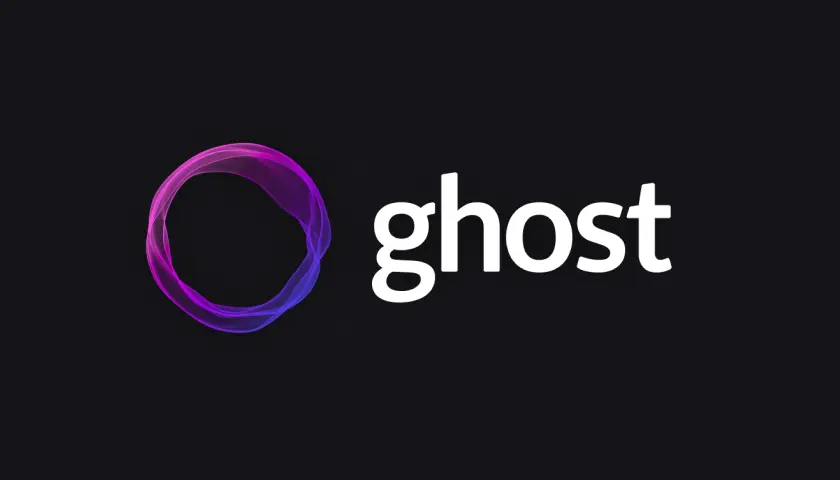
In the dynamic world of content creation, bloggers are constantly on the lookout for platforms that offer seamless experiences, powerful features, and flexibility. Ghost CMS has emerged as a noteworthy contender in the realm of blogging platforms, boasting a minimalist design and a focus on content creation. In this blog post, we will delve into a comprehensive comparison of Ghost CMS with other popular blogging platforms, exploring the unique features and functionalities that set each platform apart.
You will learn from this blog:
- Introduction
- Ghost CMS Pros and Cons
- WordPress CMS Pros and Cons
- Medium Pros and Cons
- Wix Pros and Cons
- Drupal Pros and Cons
- Conclusion
- FAQs
Ghost CMS: Power of Simplicity
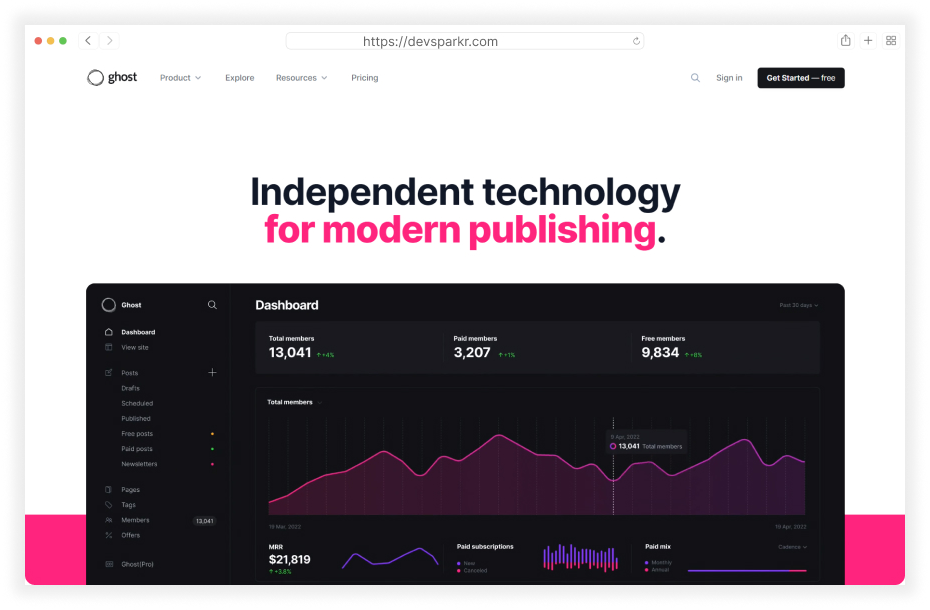
Ghost CMS is renowned for its elegant and straightforward design. Targeting a niche audience of content creators who prioritize simplicity and performance, Ghost provides a distraction-free writing environment. It features a markdown editor, allowing users to format their content effortlessly. The platform’s focus on speed and efficiency makes it an attractive choice for those who want a fast and reliable blogging experience.
Pros of Ghost:
- Minimalist Design: Ghost CMS is known for its clean and minimalist design, providing a distraction-free environment for writers to focus on content creation.
- Performance: Ghost is optimized for speed and performance, offering fast loading times for websites. This can be crucial for user experience and search engine rankings.
- Markdown Editor: Ghost uses a simple yet powerful markdown editor, making it easy for users to format and structure their content without the need for complex coding.
- Built for Blogging: Ghost is purpose-built for blogging, and its features are tailored to meet the specific needs of content creators, making it a dedicated platform for writers.
- Customization: While not as extensive as some other platforms, Ghost allows for theme customization and offers a range of themes to choose from.
- Full ownership and control: You own your blog, domain, and data, unlike Medium’s centralized environment.
- Monetization freedom: Ghost offers multiple monetization options like subscriptions, paid memberships, and direct ad insertions. No revenue sharing with the platform.
- Focus on writing: The interface is minimalistic and distraction-free, fostering a smooth writing experience.
- Scalability and security: Built on Node.js, Ghost handles large audiences efficiently and offers robust security features.
Cons of Ghsot:
- Technical learning curve: For users who are new to markdown or prefer a more visual approach to content creation, there might be a slight learning curve with Ghost’s editor.
- Limited built-in features: Requires some technical knowledge for self-hosting, though hosted plans are available.
- Marketing effort needed: You’re responsible for driving traffic to your blog, unlike Medium’s built-in audience.
- Hosting: While Ghost offers its own hosting services, users who prefer self-hosting might find the process less straightforward compared to other platforms.
Who is Ghost for?
Ghost is a versatile platform suitable for a wide range of users:
- Bloggers: It’s the blogging powerhouse for a reason, offering ease of use, SEO benefits, and community support.
- Businesses: Showcase your products, services, and brand story with a stunning website built on Ghost.
- Freelancers and Agencies: Build portfolios, showcase your skills, and attract clients with a professional website.
- Content Creators: Share your writing, photography, or videos with the world through a dedicated website.
WordPress: The Powerhouse
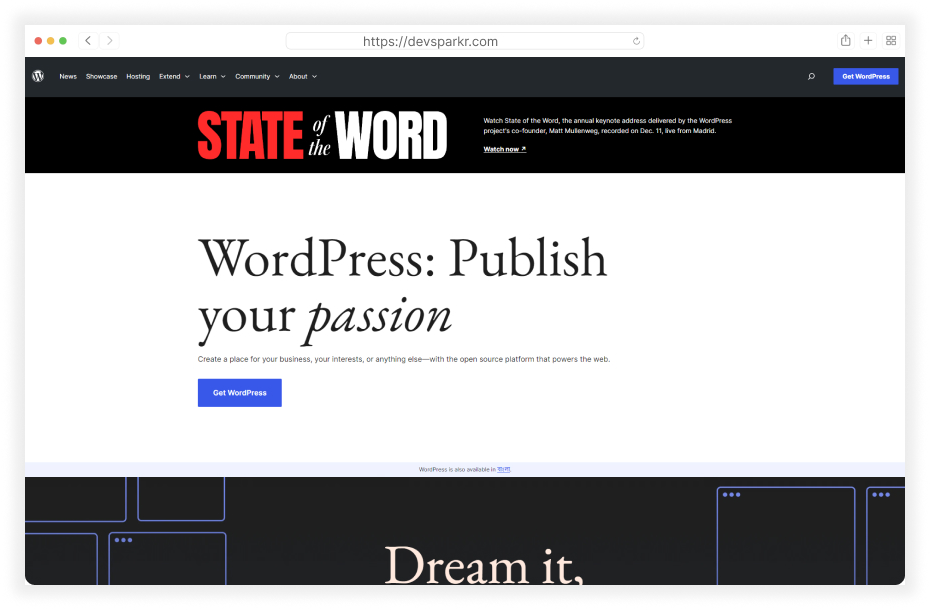
WordPress, the undisputed giant in the world of blogging, powers a significant portion of the internet. Its vast ecosystem of plugins and themes makes it incredibly versatile. WordPress caters to users with varying technical expertise, offering both a hosted service on WordPress.com and a self-hosted option on WordPress.org. While its feature-rich environment is a strength, it can be overwhelming for those seeking a simpler blogging experience.
Pros of WordPress:
- Free and Open Source: The core software is free to use, making it accessible to everyone. You just need to pay for hosting, which can be budget-friendly.
- Easy to Use: Even non-technical users can create beautiful websites with WordPress thanks to its intuitive interface and plethora of themes and plugins.
- Highly Customizable: Thousands of themes and plugins let you tailor your website to your exact needs and desires. Want an e-commerce store? A portfolio website? A forum? WordPress has a plugin for that.
- SEO Friendly: WordPress is built with search engine optimization (SEO) in mind, making it easier to get your website noticed by search engines like Google.
- Large Community: With millions of users and developers, there’s a vast community to help you troubleshoot any issues you might encounter.
Cons of WordPress:
- Complexity: While easy to get started, WordPress can become complex with advanced customization and plugins. Keeping everything updated can be a chore.
- Learning Curve: While user-friendly, mastering its full potential requires some effort.
- Security Concerns: Being open-source, WordPress can be vulnerable to security threats if not properly maintained.
- Performance Issues: Highly customized websites with many plugins can become slow and sluggish.
- Vendor Lock-in: Migrating your website away from WordPress can be difficult due to its customizability.
- Plugin Overload: Too many plugins can slow down your site and create compatibility issues.
- Update Headaches: Regular updates are crucial, but managing them can be time-consuming.
- Limited Control: Your website relies on WordPress infrastructure, so major changes require technical knowledge.
Medium: Social Publishing Platform

Medium has gained popularity as a social publishing platform that encourages writers to share their thoughts with a broader audience. With a focus on clean design and a built-in audience, Medium offers a hassle-free environment for writers. However, it comes with limitations in customization and ownership, as the platform retains control over content distribution and monetization.
Pros of Medium:
- Instant visibility: Leverage Medium’s existing audience and distribution channels to reach readers quickly.
- Easy to use: Simple interface and minimal setup make it beginner-friendly, even for non-technical users.
- Built-in features: Analytics, SEO tools, and social media integrations are readily available.
- No maintenance hassle: Medium takes care of hosting, security, and updates.
- Monetization potential: Earn through Medium’s Partner Program (requires consistent high-quality content).
Cons of Medium:
- Limited control and ownership: Less customization options, and Medium holds your data and content.
- Revenue sharing: Medium takes a cut of your earnings if you’re in the Partner Program.
- Less Customization: You have limited control over design and functionality compared to Ghost.
- Earnings Potential: The Medium Partner Program can be competitive, and income may not be consistent.
- Platform Dependence: Your blog is tied to Medium’s platform, making it difficult to migrate elsewhere.
- Content restrictions: Medium has stricter content guidelines and may remove posts deemed unsuitable.
- Competitive audience: Harder to stand out amongst a vast pool of other Medium writers.
Wix: Drag-and-Drop Website Builder

Wix stands out as a website builder that caters to a wide range of users, including bloggers. With a drag-and-drop interface, Wix allows users to create visually stunning websites without the need for coding skills. While it provides creative freedom, it may be considered overly complex for those who desire a more streamlined and writing-focused platform.
Pros of Wix:
- Beginner-Friendly: No tech expertise needed – perfect for entrepreneurs, artists, and anyone with a story to tell.
- Visually Stunning: Beautiful templates, high-quality design tools, and a user-friendly interface make creating professional-looking websites a breeze.
- Feature-Rich: From blogs and galleries to e-commerce and email marketing, Wix offers a wide range of tools to meet your needs.
- Scalable: Start with a simple website and upgrade as your needs grow, without needing to switch platforms.
- Mobile-Responsive: Built-in mobile optimization ensures your website looks great on all devices.
Cons of Wix:
- Cost: While you can start with a free plan, most features require paid subscriptions, which can be pricier than other options.
- Limited Customization: Once you choose a template, changing it later can be difficult or impossible.
- Less Control: You don’t have full access to the website’s code, which limits advanced customization and integrations.
- Slower Loading Times: Compared to self-hosted platforms like WordPress, Wix websites can sometimes have slower loading times.
- Vendor Lock-in: Migrating your website away from Wix can be complicated and time-consuming.
- Performance Concerns: Some users report slower loading times compared to other platforms.
- Fewer Plugins and Integrations: The selection of plugins and third-party integrations is not as extensive as some competitors.
- Limited Scalability: Wix may not be the best choice for websites with high traffic or complex needs.
Drupal
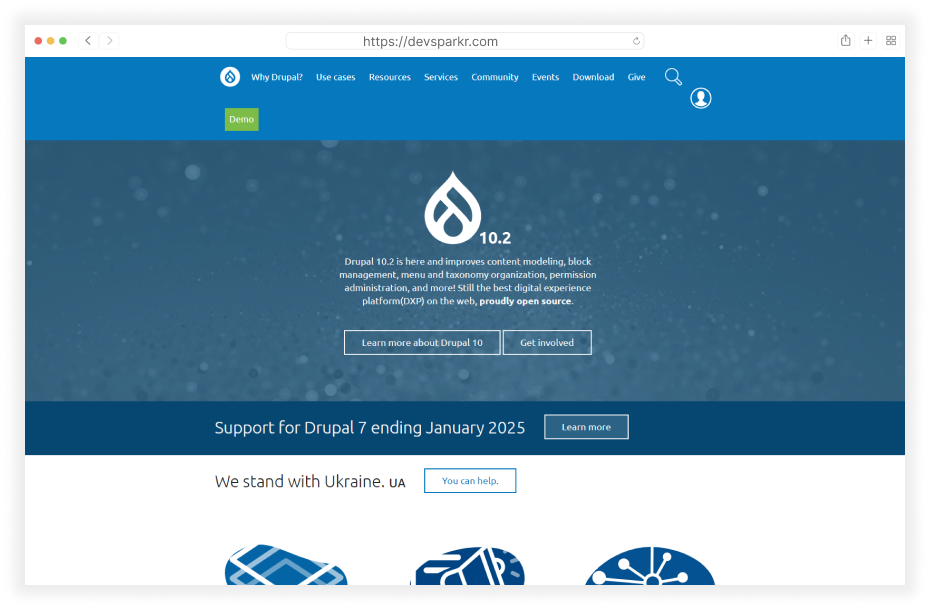
Drupal isn’t your average website builder. It’s a content management system (CMS) forged in the fires of flexibility and power, often favored by developers and complex websites. But is this mythical beast the right companion for your digital journey? Let’s unveil the strengths and weaknesses of Drupal, so you can decide if it’s the perfect steed for your online adventures.
Pros of Drupal:
- Flexibility Unbound: Build anything from simple blogs to intricate online communities and complex applications.
- Scalability for Dragons: Handle massive traffic and complex data structures with ease.
- Security Fortified: Renowned for its robust security features, keeping your content safe and sound.
- Community Strong: A passionate and knowledgeable community offers support and resources.
- Open Source Freedom: Free to use and modify, giving you complete control over your website.
- Multilingual Prowess: Build websites in multiple languages seamlessly.
Cons of Drupal:
- Steep Learning Curve: Not for beginners. Mastering Drupal requires technical knowledge and dedication.
- Development Reliance: Setting up and customizing can be complex, often requiring developer expertise.
- Less User-Friendly: The interface can be overwhelming for those unfamiliar with CMS systems.
- Performance Considerations: Careful configuration and optimization are needed for optimal website speed.
- Limited Out-of-the-Box Features: You’ll need modules and extensions to achieve even basic functionalities.
- High Maintenance: Keeping your Drupal site secure and updated requires ongoing effort.
Conclusion
Choosing the right blogging platform depends on individual preferences, technical requirements, and the specific needs of content creators. Ghost CMS distinguishes itself by prioritizing simplicity, speed, and a distraction-free environment for writers. Each platform, whether it be the powerhouse WordPress, the social platform Medium, the user-friendly Blogger, or the visually oriented Wix, offers a unique set of features to cater to diverse blogging styles. Ultimately, the best choice comes down to personal preferences and the specific goals of the blogger.
FAQs
Do you have any questions about How to Start Making Money with Your Blog Website in Ghost CMS? We have answers to some frequently asked questions on the topic.
Which platform is the most cost-effective?
- Ghost: Paid plans start at $9 per month, but require self-hosting.
- WordPress: Free open-source software, but requires web hosting and may need premium themes or plugins.
- Medium: Free to start, but limited monetization options and control over your content.
- Wix: Free plan with basic features, paid plans range from $4.50 to $39 per month.
- Drupal: Free open-source software, but may require paid hosting and developer costs for complex implementations.
Which platform is best for monetizing my blog?
- Ghost: Offers built-in member subscriptions, email marketing, and integration with Stripe for various monetization options.
- WordPress: A vast plugin ecosystem allows for diverse monetization methods, but requires setup and management.
- Medium: The Medium Partner Program can generate income through reads and views, but payouts may be low and competitive.
- Wix: Limited monetization options through ads and premium plans.
- Drupal: Requires custom development and integrations for most monetization strategies.
Which platform is the most secure?
- Ghost: Securely built but requires user maintenance of hosting and updates.
- Drupal: Known for its robust security features with regular updates and vulnerability patching.
- WordPress: Requires careful plugin and theme management to maintain security.
- Medium: Secure platform, but you don’t have full control over your content security.
- Wix: Secured platform, but vulnerabilities can occur with third-party integrations.
What are some alternatives to Ghost CMS?
You can also consider platforms like Substack, Squarespace, Blogger, and Webflow.
Hi, This is Biplob Hossain. I am professional content writer. I successfully wroten a lot of content about Web development topics. I am also good web developer.
Related Articles
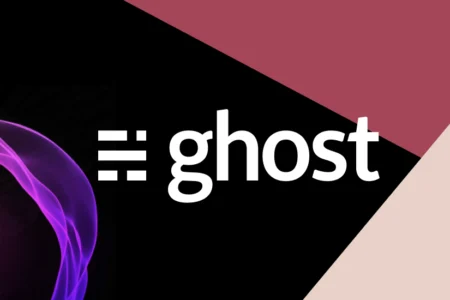
How to customize your blog website in Ghost CMS
Unleash your creativity and personalize your blog with this comprehensive guide to customizing your Ghost CMS website. Learn how to install and activate themes, modify site settings.
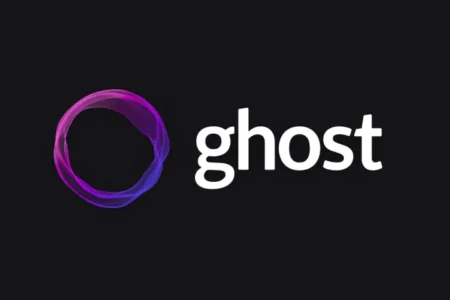
A beginner’s guide to use Ghost CMS in 7 Steps
Learn how to create your own blog using Ghost CMS, a powerful and easy-to-use content management system. This beginner's guide will walk you through the steps of installing Ghost,...
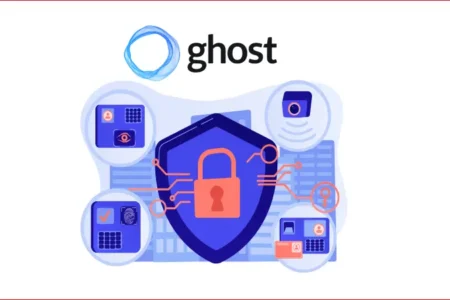
Complete security 5 Tips: How to Secure Your Ghost Website
Learn how to implement crucial security measures, from strong passwords to SSL certificates and brute force protection. Keep your Ghost Website safe and sound!